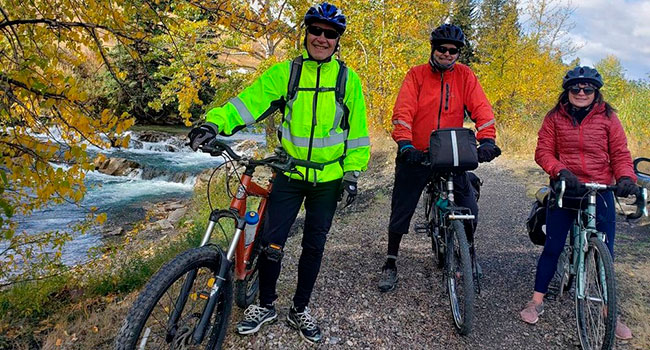- It’s not about where we travel but why


Of all the things we do that have changed since the arrival of COVID-19, one that has altered the most is travel. And it’s not only about when and where we go, but also why.
Spending Christmas in a sunny, warm resort is no longer a legitimate reason to travel, as a few politicians have learned in recent days. Beyond the mind-boggling hypocrisy of doing so while urging others to stay isolated at home, such travel just defies our sense of what’s right.
And this moral questioning of travel isn’t just rooted in the pandemic. If you reach further back than the world of just a year ago, you’ll find there was already a growing backlash to the over-tourism that has turned the world’s great landmarks – from Machu Picchu to the Louvre to Stonehenge to the pyramids of Egypt – into elbows-up contests to grab a front-row seat.
Affluent travelers have, in effect, turned the world into a cruise ship.
Journalist Rebecca Tucker reflected on this in a recent column, when she wrote that pre-pandemic tourism “was an industry marked by gluttony: Travel was marketed as a proposition of how many places a person can go, how much they can see and how many likes they can get on Instagram, rather than how they might be nourished by an experience abroad.”
As the world slowly beats back the threat of COVID-19, there will come a day when we can travel in relative safety once again. When we do, let’s hope that we won’t simply fall back into our old tourism bad habits. Instead, let’s embrace this new world of slow tourism.
What the heck is that?
The idea is borrowed from the slow food movement, which emerged as an antidote to the shabby nutritional and esthetic value of fast food outlets. The idea was to eat local, and to take your time to prepare and consume food that’s as good for you as it tastes.
Slow travel is an attempt to improve the spiritual nutritional value of striking out on an adventure. Rather than rushing around ticking off a list of destinations, slow travel would have us go to fewer places, spend more time in one place, and savour the experience by immersing ourselves in local culture. The richness of such experiences is as much healthy food for the soul as the 100-mile diet is for the body.
My wife and I aren’t without fault in this tourism game. We have a world map with destinations scratched off, showing the sites we’ve conquered and inspiring us to make a conquest of many more. Yet this year we’re stepping off the tourism merry-go-round, perhaps forever.
This summer, assuming the pandemic is brought to heel, we’ll gather with a handful of friends and set out on a different kind of adventure. We’ll dip our bicycle wheels in the Pacific Ocean at Victoria and set out on an 8,000-km two-wheeled journey east.
Although the final stop is to be St. John’s, N.L., some four months later, we don’t consider it to be the ‘destination.’ Instead, the destination will be Nelson, B.C., Rosetown, Sask., Owen Sound, Ont., Portneuf, Que., and dozens and dozens of other communities across this vast country that form the core of who we are.
Our group has even given itself a name. We call it ConnecTour – a collection of ordinary adventurers who are travelling at the speed of life, seeking to connect with fellow Canadians across the country.
With the isolation made necessary by the pandemic, many of us feel disconnected from our friends, neighbours and communities. It’s time to rebuild the fibre that holds us together – as citizens of a country whose future depends, after all, on a very simple idea: that, together, we can do great things for each other and for the world.
We’ll study the mosaic of these communities, meeting the often fascinating and courageous people who live there. We’ll learn their stories and share them with you, here on Troy Media and in our ConnecTour blog, called Tales from the Road.
At the beginning of this column, I said one of the ways in which travel is changing is the ‘why.’ Many tourists have gone to destinations so they can boast about having been there. Now, we’re setting out to prove that there is a much more rewarding reason to travel – to learn how much people have in common everywhere, in spite of outward appearances that might suggest the contrary.
The Transformational Travel Council calls the shift in priorities “conscious travel.”
“A more conscious travel holds the potential to bring more personal fulfilment, compassion, stewardship, equality, and belonging,” the organization states. This mindset can be infused into everything you do – influencing where you go and how, how you give back, and what you do at home and when on the road. The payoff reaches far beyond gathering a collection of Google photos for Instagram. Done right, it leads to deeper personal fulfilment, compassion, stewardship, equality and belonging.
You should consider doing something similar. Think about the next destination you want to go to and why. What will you get out of the experience? And, equally important, what will you give back?
You can even join with our little group if you like, for a day, a week or even for four months. It’s a perfect opportunity to be the change you want to see.
There’s a richer world out there waiting for us. We just have to slow down to discover it.
Veteran political commentator Doug Firby is president of Troy Media Digital Solutions and publisher of Troy Media.
For interview requests, click here. You must be a Troy Media Marketplace media subscriber to access our Sourcebook.
The views, opinions and positions expressed by columnists and contributors are the author’s alone. They do not inherently or expressly reflect the views, opinions and/or positions of our publication.
